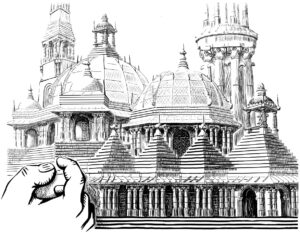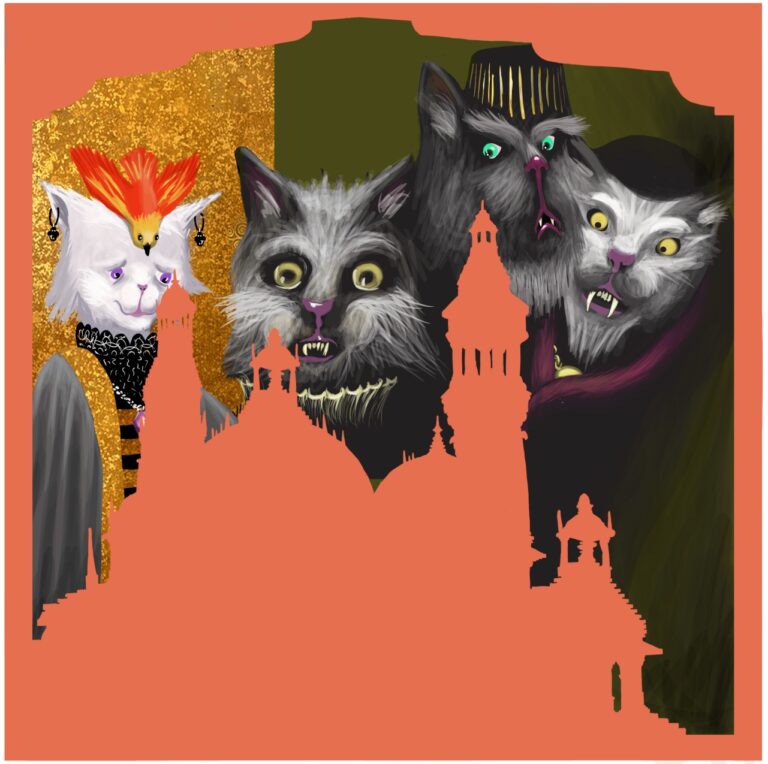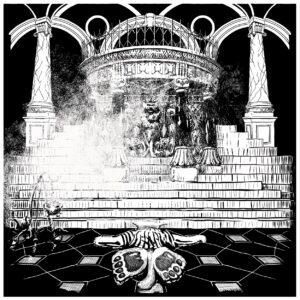
Thank you.
Your message has been sent and will receive a response.
Meanwhile, you can access
HunGar Book Galley
By clicking HERE.

The Cat Queene buildeth a costly temple
For some weeks Alfred A. Brussel was the Queen’s guest while she discreetly made enquiries. First, she had his own rats questioned. Not trusting the accuracy of the reports she would receive second-hand, she audited the interrogations in person, hiding behind an arras. She was not surprised that the Architect’s account was largely corroborated by his servants. Naturally, he would have rehearsed with them the story to tell, regardless of its veracity. So, she also dispatched cats to slip into Ratona to gather intelligence. Not all rats were loyal to Othon, nor all cats loyal to her. Some of each were in pay of the enemy as both informants and purveyors of false information. Her agents had no difficulty in confirming that the emerald-eyed magician and the miraculous temple he had built had indeed saved the rats’ tails, for so much had this become common knowledge up and down the rat realm that it was not to be doubted.
So, five weeks after his arrival in Kitania, the Architect was bidden to wait on Her Majesty in her Bed-room of State, where, bathed in the admiring glances of suitors from various principalities and earldoms, all eager to console her for the recent loss of her consort, she was busily putting her name and seal to writs of elevation and execution. She did not put down her quill, but with an air of much preoccupation said, ‘Thou mayst build thy temple, Green Eyes. Should it be pleasing to us as thou vauntest, we will reward thee generously far above the Rat. Three chests of treasure, twelve slaves and a princess of thy choice for wife shall all be thine.’
The Architect made low obeisance. ‘Your munificence, O Queen, outshines your beauty, impossible as that may seem to any who have beheld your visage. You will not regret your decision, I promise. Sadly, it is not the custom of my land to marry cats. We marry only our own kind. Preferably the same denomination of Reformed Christian. I agree, it is a deplorable prejudice, but there it is. There’s no arguing against benightedness. My bride and I would be socially censured. I do not wish any of your princesses to suffer such insult and injustice. May I ask, therefore, for four treasure chests and fifteen slaves?’
‘As thou wishest, Green Eyes,’ said Katerina. ‘I cannot condemn the customs of thy land, for I daresay such a marriage would cause equal scandal in this realm.’ With that she paused in her scribbling to give his extraordinary appearance a meaningful stare from head to toe.
Alfred A. Brussel reverently bowed, too moved by Katerina’s generosity to speak. Later, as he had done with the Rat King, the Architect made various requests as to his living and working arrangements, which, however, were considerably plusher than what he’d asked Othon to furnish. The Queen, upon being apprised of these requests, conceded to all. She permitted him Nayel as well, and, though Brussel did not ask for it, she saw to it also that the other rats were moved to a nicer dungeon, with two rations of gruel a day.
Four weeks passed. The Architect invited the Queen to visit his house. There was a curious object on a table.
‘There it is, Madam.’
’There is what?’

‘Your temple.’
Her Majesty was most perplexed. ‘But it is tiny. Our Goddess scarce could fit a paw inside.’
Oh, no, Your Majesty,’ giggled Brussel. ‘This is but a miniature facsimile, a toy, of what the real temple will be.’
‘Really? Then, how big will it be?’
Brussel scanned the table. ‘Ah!’ He pulled a piece off a kneaded eraser, squeezed it into a figurine and stood it beside the model. ‘There, that is you, Your Majesty, entering the gates of your temple.’
The Queen gasped. ‘And, and, how large be our present temple?’
‘Oh,’ said Brussel, who did not wish to unduly alarm her. ‘A good deal smaller. Come, Madam, to see it as it really shall appear, you must squat down. Wait! If I may?’ He had trotted off and returned with a footstool. ‘Kneel on this. Put your eye just above the surface of the table, so you’re as high as the figurine. Exactly! Now gaze up at the magnificent façade!’
The Queen was over-whelmed. ‘Oh my,’ she gasped. ‘Oh my.’
‘The columns and entablature of the colonnades belong to an order never before seen on Earth, for it sprang from my own genius. I have called it the Katatonic Order, after you, Your Majesty.’
There was silence while the Architect allowed the Queen to take in everything. But when her speechlessness was prolonged, he said, ‘A good deal more than you would wish, Madam, but not more than you can afford.’
She stiffened, and rose. She did not like her thoughts read and she was sensitive about money, which seemed to her to be a concern beneath the dignity of a Queen. ‘It is a very pretty thing,’ she said, ‘but, I regret, not what we are looking for, I think.’
‘I am sorry to have disappointed Her Majesty,’ said Alfred A. Brussel, with a bow, but not looking that sorry in fact, for he had seen the lust that had flickered in the Queen’s eye, and even now she stole glances at the exquisite little model. ‘Would you do me the honour at least of accepting the object, trifle though it is, as my gift?’ He picked up the model and presented it to her. Without thinking, she reached out eagerly to accept it, then, remembering her dignity, she nodded to her lady-in-waiting to take it.
‘Your Majesty’s hospitality has been most appreciated. I do not wish to outstay my welcome. May I, however, humbly beg a day or two to prepare my departure?’
‘By all means, sir, take as much time as needed. I am most indebted to thee for thy troubles. Indeed, I would be sorry if thou didst not remain another three or four days.’
The Queen took the toy to the upper room to which she alone had the key, loth for any to see it, for she knew it was beyond her reach, and if the limit of her reach were to be so explicitly manifested to others, it would bruise her pride all the more. Her secret enemies at court would take malicious pleasure in her frustration, and her friends . . . but a sovereign had no friends.
It prayed on her mind. Several times each day, when its call became insistent, she went to the upper room to look at it. She would kneel on the floor to be the correct size and gaze up at it from every angle. The more she reprimanded herself and told herself that she could not have it, the more ardently she desired it. Such a monument would leave the Rat God leagues behind. The supremacy of the Cat Goddess, to which her own repute was inextricably bound, would be manifest for all to see. A progenitor of countless edifices the world over, all built in the Katatonic Order, would trumpet her name before the nations. Would not such a victory gall the gloating Rat?
Exhausted in mind by her struggle against the thing’s charm, which seemed to strengthen the more she resisted, she sought counsel with her Chief Priest, Royal Chancellor and Master of Works, summoning them to the upper room to examine the toy. Crowded into the small chamber, they were unsettled by Her Majesty’s unusual choice of meeting place and mystified by the strange little object. Their puzzled faces switched to ones of astonishment when she explained the things purport, which she did tell herself was exactly the response she desired, ‘for, certes,’ she had argued with herself when determining to summon them, ‘they will zealously discourage the building of so extravagant a work, which counsel will serve to fortify my own resistance.’ Though less frank with herself in the admission, she clung also to a tender, hopeful shoot that they might unexpectedly throw their support behind the enterprise. She felt a tinge of disappointment, therefore, when the Chief Priest declared that the fashioning of the temple was religiously dubious and its arrangement liturgically unsound, the Chancellor warned that it would clean out the royal coffers, and the Master of Works was of no uncertain mind that it would fall down.

‘Then ye have no word to speak to its favour?’ she asked.
Her three advisors gravely shook their heads, staring at the thing as if it were a caged scorpion.
‘I do thank you, sirs, for your frank and sober redes,’ she said. ‘You have only confirmed me in mine own thoughts.’
They each knelt in turn, awkwardly in the tight space, and took their leave, tripping over each other’s robes in their haste to flee, much relieved in mind that the realm had narrowly missed catastrophe. Queen Katerina, however, remained long in her upper room staring at the object with adoration and fear. The advice of her councillors, she had discovered, bore no weight with her, for it was in the sharing of the secret with them that she had made her final act of submission to the beguiling thing’s imperative. Their discouragement did but fuel her passion.
So, the temple went up and the coffers went down. Orders went out for rare and costly materials, and tax collectors went out to inspect the inside of every earl’s treasury and to relieve every pauper of his pence. Every cat who had the liberty to travel found some pretence to visit the capital to gawk at the marvel. Startling reports were relayed, third-, fourth- and fifth-removed, to the rat city and reached the ear of Othon XVIII. Othon both refused to believe these tales and raged at the duplicity they laid bare. He oft peered in his magic boxes to renew his conviction of his temple’s surpassing splendour and, more to the point, its existence. Then, asking himself why Katerina’s rising temple could be seen and even touched without magic boxes even by plebeians, beat his breast and gnashed his teeth for having been a sucker. He dwelt obsessively on every occasion he had been tempted to stick a dagger in the Architect’s throat, now bitterly rueing so many squandered opportunities.
Mean-times, the Queen suffered also. When the temple was but one-quarter raised, Her Majesty had a sick feeling in her belly, like after eating rotten fish, that she had made a bad mistake. When it was half-raised, she was, as the repentant swimmer half-way across a lake who knows both shores are equally beyond reach, convinced of her tragicall folly. Money poured into the city through its gate, but so did troops of artisans from far-off lands, all needing board, lodging and their weekly pay. How delighted Othon would have been had he known the exquisite torture the Queen endured as she watched the tortoise-and-hare race between the temple, which seemed barely to budge from one week to the next, and the money disappearing like water through a sieve. If the Architect did not like some work he would order it pulled down as casually as one might order a gardener to pull up a row of shrubs. He had an unassailable answer to every objection over every excess, including the Queen’s. After a futile argument with him she sometimes took to her bed for the remainder of the day. Some mornings she barely had spirit to rise. Other mornings she thought of fleeing the city and spending her remaining years hidden in a nunnery. Ever she was tempted to halt the construction. What sort of existence would it be, however, to see her failure mocking her every day from her window? And to pull it down, oh, the humiliation!—and how much would even that cost? Recoiling at both alternatives, she would put off her decision for another day, and so the temple was now three-quarters raised. Here it halted. The Queen was clean out of money. Every source was wrung dry. She’d sold her jewellery, her tiara. Everything was mortgaged. Her subjects were thoroughly shorn and on verge of revolt.
Cats, desperate and starving, formed gangs of brigands and invaded Ratona to thieve whatever could be traded, and to trap rats of any degree that they could get their claws on. But unlike happier days, when these captives would have been trussed up and garnished for the festal fires, now they were ransomed back to the rats for coin. Their successes emboldened these roving marauders to push beyond the hinterlands and into the heartland of Ratona, where gains were fatter. These new profits in ransoming titled souls was a trade others saw they could have a share in. Mice had always been the minions of Ratona. They resented the despotic rats, but were never able to successfully rebel, for, though exceeding in number the rats, they were puny. Most were desperately poor. Now they had information to sell. More than one ransomed rat lord, returning to his estate, discovered that the mice were somewhat more prosperous than when he had departed. He could not, however, very well exterminate his entire labour force.
These hordes of cats, causing division, unrest and chaos in his lands, infuriated King Othon XVIII. He was appalled also by this sale of his lords, as if they were commodities, like wives or maize. On first receiving news of this novel development, it baffled him. How could you sell honour any more than you could air or sunshine? When these lords returned, they seemed diminished. They carried a stain into Ratona, just as a maid gotten with child by a rapist brings disgrace to her family. Moreover, he knew where the gold was going. It enraged him to be paying the Cat Queen’s construction bills. Something had to be done to restore order.
The idea of such trade had also stunned Queen Katerina when first Alfred A. Brussel had brightly proposed it to her as a way out of her straits. Lords abducted, captured in battle, were invaluable sacrificial victims. It made no sense to sell them back to the rats. Indeed, it was a sacred obligation to dedicate them to the Cat Goddess. To deprive her of her rightful viands would be to invite her wrath.
Then, in the pale hour before dawn, after a night of tossing and turning, pursued in dreams by rapacious beasts with horns and I.O.U.s, Katerina was captured and bound at her wrists and ankles. Instead of being violated by disgusting rats, however, or flung off a cliff, as she anticipated, she found herself conducted before the Cat Goddess upon her high seat. ‘Daughter,’ quod the Goddess, ‘with much satisfaction have I watched the building of this temple. At last I shall be glorified by a fitting dwelling place. Thy name, too, shalleth be renowned. It would be a disgrace to us both should this temple instead become a mockery, making of us laughing stocks. I know, too, the burden of worry thou hast borne, which moveth my compassion. For, though I be a drad Goddess without pity for the disgusting rats, I have also a mother’s bosom sorrowing for the suffering of her child and a maternal desire to succour her. I urge thee, therefore, to heed the council of this Architect. I will deliver thee the vile lords of Ratland for sale in such number that this splendid building be brought to happy completion.’ Then the Queen found herself awake and much easier in mind than she had been for a long time.
Meanwhile, King Othon XVIII had dispatched an army to patrol his hinterlands. He thought that once the cancer was cut out where it was most malignant, the rest of Ratona would more quickly be restored to health. To the rats’ ill fortune, however, one of the chiefs of the invading felines was, in addition to crook and cutthroat, an uncommonly skilled tactician. Buttons of Soriana hight was he in his later career, though in truth his origins were unknown. Perhaps behind a trash cans in a wretched alley was the place of his nativity, and it was in alleys and sewers that he fought to eat, and learned the agility of temper and deftness of mind that now served him. He organized the disparate feline gangs into a coordinated force. By his clever tricks he took by ambush so many divisions of King Othon’s army that its numbers evaporated without ever engaging in open combat, so alarming Othon that he recalled the army and sacked its general. Mean-times, the rank and file of the captured rodents were burnt on the altars of Kitania, while the abundance of degreed hostages brought in enough profit to finish the temple and apply the final touches of gilt to the mouldings.

On the morning of the temple’s consecration, the most poignant moment came with the entrance of Katerina. Not in diadem, jewels, furs and feathers did she arrive, nor on sedan. Not with pomp and ceremony befitting the sumptuous setting did this erstwhile haughty regina make her triumphant entrance. Nay, shockingly, between files of her subjects, all bedecked and festooned, on this wintery day the Queen trod unshod, in undyed peasant tunic, uncovered head humbly bowed. Her eyes were sunken in their sockets. She looked a ghost of her former self. She halted before the high altar of the Cat Goddess, ablazened with painted carvings, behind which were ranked her priests in elaborate gowns and headdresses. Then, as the multitudes held their breath in suspense, she burst into tears and flung herself on to the tessallated pavement, prostrating full length. Profound silence reigned in the hall. Many were aghast. The Architect, snug in otter-fur mantle, mouse-skin gloves and gleaming aubergine top hat made just for the occasion, dabbed a tear in one eye. It was, as he oft repeated thereafter, one of the most touching scenes he had ever witnessed.
For the brilliant successes of his daring exploits, Buttons of Soriana won high renown. At the feast following the consecration he was seated at the same table as Her Majesty, his chest newly decorated. Beforehand he had audience with his sovereign. She bid him rise from his knees, clasped him on his shoulders and kissed his nose. Rough and uncouth though he appeared before that dainty, groomed and refined Queen, it was she who, staring into his startling violet eyes, was abashed and found herself shy as a kitten. She surprised herself by impulsively declaring to her assembled court that she granted him senorship over the estates vacated by Ginger’s demise. Though forbearing from giving him the key to her heart just yet, she thought she might lend him a key to her Privy Bed-chamber.

Your message has been sent and will receive a response.
Meanwhile, you can access
By clicking HERE.